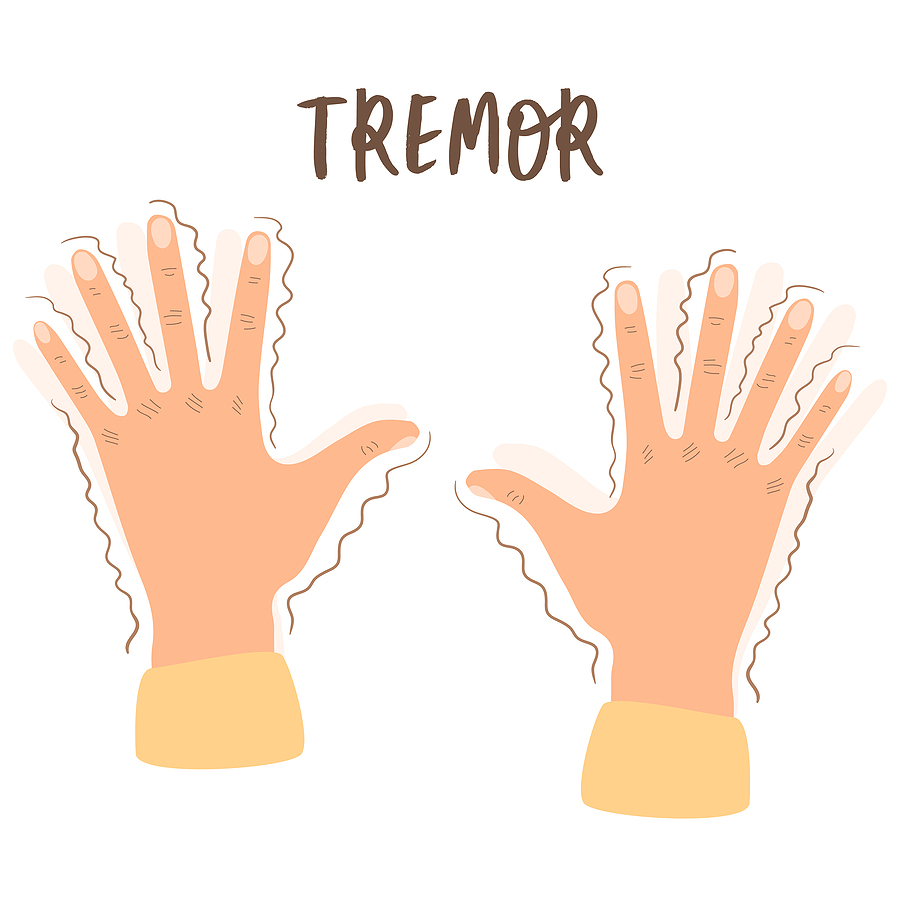
Flat vector illustration of a tremor. Trembling in the hands-symptoms of various mental disorders, panic, fear, Parkinson’s disease. Isolated design on a white background.
Dr. Joon Faii Ong is a recognized expert on Essential Tremors. He explained that many forms of Tremors could affect people with Parkinson’s Disease or Essential Tremors, which is Dr. Ong’s area of expertise. Essential Tremors can also affect people with Parkinson’s Disease or those who have had a stroke or some type of brain injury, such as traumatic brain injury (TBI).
Essential tremor is the most common movement disorder, and it affects approximately 10 percent of persons over age 65. This type of tremor has no other symptoms than trembling or shaking. Therefore, it is sometimes simply referred to as a “benign tremor.” There are many forms of Essential Tremors, but they all share these three key features:
- Involuntary shaking of the hands when they are at rest.
- Tremors increase with action, such as moving the arms or holding a cup.
- Tremor intensity decreases when the hand grips an object tightly.
Essential Tremors can be an indicator of several other conditions that can affect the brain or other parts of the body, including:
Parkinson’s Disease
Tremors that indicate Parkinson’s Disease often begin on one side of the body and affect the hand, arm, or leg. They can also cause a shuffling gate when walking.
Stroke
Following a stroke, some people experience tremors as part of their recovery process. These tremors usually do not manifest until several weeks after the initial incident and are known as “post-stroke” tremors.
Post-Traumatic Brain Injury
Post-traumatic or acquired brain injuries can also cause a form of tremor known as a “mild TBI,” which stands for mild traumatic brain injury. This type of injury can result from a one-time event, such as a fall, accident, sports injury, or car accident.
Brain Tumors
Tremors can also indicate the presence of brain tumors. If you have a tremor and experience other symptoms, such as mood swings, coordination problems, or vision changes, seek immediate medical attention to rule out these potential causes.
Multiple Sclerosis (MS)
Multiple sclerosis is a degenerative central nervous system disorder. The effects and symptoms of MS can vary widely from person to person and range from numbness, lack of coordination, and blurred vision to tremors and unconscious or uncontrolled movement, such as spasticity or dystonia.
Friedreich’s Ataxia
Friedreich’s ataxia is an inherited disorder of the nervous system. Symptoms can include impaired balance, lack of coordination, and tremors or “shaky” hands.
Dystonia
People with dystonia experience uncontrollable movements of the limbs, torso, face, and vocal cords. These involuntary muscle contractions may cause significant pain and lead to abnormal postures ranging from slight tilts of the head or neck turns to full body contortions. Dystonia is usually more noticeable during times of stress and can result from several potential causes, including:
- Injury or trauma that affects the central nervous system.
- Genetic abnormalities present from birth cause progressive degeneration of certain areas of the brain.
- A side-effect from medications, such as antipsychotic drugs, antibiotics, and chemotherapy agents.
To read more on topics like this, check out the blog category.
Leave a Reply